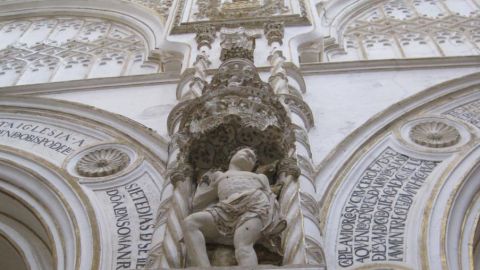My Questions for Leah Libresco

As you may be aware, Leah Libresco at Unequally Yoked had a startling announcement yesterday: she’s converting to Catholicism. I have to admit, though others will no doubt chastise me for missing obvious-in-retrospect clues, that this was something I didn’t see coming at all. As recently as March, when I met her at the Reason Rally, I had no idea that a shift in her personal views was imminent (if anything, I drew the opposite conclusion from her enthusiastic participation in the rally).
But be that as it may. I have no right to require another person to explain their decisions to me, no matter how bizarre or ill-advised I find them. However, I confess to intense curiosity, verging on bewilderment, as to what could have caused her views to change so drastically. Therefore, in the manner of Melissa McEwan’s prescient questions for Barack Obama, I’ve written up a few of my own. I’m not saying she’s under any obligation to answer any of these. I’m saying that these are the things I’m most curious about, and that I hope she’ll address in her future posts.
1. Why a person? Even if you believe that morality is, to use Leah’s words, “some kind of Platonic form, remote from the plane that humans exist on”… how do you get from there to the belief that morality is embodied by a person? What evidence or chain of reasoning leads you to conclude that morality isn’t just a set of impersonal, self-existent principles or laws, like mathematics, but a conscious being who has thoughts, desires, preferences and emotions that are analogous to the thoughts, desires, preferences and emotions of human beings?
2. Why Roman Catholicism? I see no way to get to the conclusion that morality is a person, but even if you did, how do you then justify the vastly larger step of asserting that this person is identical with the concept of God as commonly believed in by one particular religion out of all the countless thousands of religions on this planet? In other words, why choose Roman Catholicism specifically, rather than deism, Quakerism, Unitarianism, or any other religion? Taking this step requires you to assent to a huge list of factual propositions, none of which, so far as I can see, can possibly be deduced even if we take the personhood of morality as a starting axiom.
Here are some of the ones that I can name off the top of my head:
This list could go on and on. What evidence or chain of reasoning leads you to believe that all, or any, of these things are true? (I take Leah’s declaration of Catholicism as evidence that she now believes some or most of these. If she rejects most of them, then what information is conveyed by her calling herself a Catholic?)
3. What about the bad stuff? Neither the Bible nor the Catholic church sets an enviable moral example, as I know Leah is aware. There are verses which endorse appalling violence, including more than one instance of divinely sanctioned genocide. There are verses which explicitly sanction slavery, which endorse the lesser worth of women, which command us to murder friends and loved ones of different religions. The Catholic church considers this book to be, at the very least, the most perfect, admirable and unsurpassable book on earth. Is this an assessment with which Leah now agrees?
And then there are the missteps in the church’s own history, which cast considerable doubt on its claim to be a moral exemplar. There’s the infamous Index of Forbidden Books, in which church authorities for several centuries presumed to instruct the entire Western world on which ideas could not be expressed. There are the popes who sanctioned the slave trade. There was the period of centuries in which the church said that theocracy was the only legitimate form of government (which lasted until 1906 at least). If the Catholic church had any privileged access to the true source of morality, are these the outcomes we’d expect? Through the centuries, has the church as a whole been noticeably more peaceful, more ethical or more compassionate than any non-Catholic society around them?
4. No, seriously, what about the bad stuff? In the modern day, the Catholic church continues to be an influential enemy of moral progress worldwide. Its relentless anti-gay bigotry has extended the denial of equal marriage rights to same-sex couples. It’s closed adoption agencies because it would rather see children remain orphans than place them with gay couples. Its pseudoscientific scare-mongering about the efficacy of condoms has almost certainly caused millions of people in poor, uneducated regions of the world to die from AIDS and other STDs. Its opposition to safe, legal contraception and abortion has likewise caused the deaths of millions of women, and its advocacy against family planning contributes to whole societies being trapped in grim cycles of self-perpetuating poverty. And then, of course, there’s the still-unfolding sex abuse scandal, in which a worldwide network of bishops conspired together for decades to protect child rapists, cover up their crimes, and intimidate their victims into silence, ensuring that said predators could rape and molest a far larger number of children than they’d have otherwise been able to.
Whether or not Leah agrees with any of these policies, I want to hear how she responds to the charge that by supporting the church – either with her money, or simply with her very public declaration of allegiance – she thereby makes herself complicit in them.
The Catholic church is hardly the only institution in the world that’s done evil, of course, but there’s a significant and obvious moral difference between an authoritarian church and other kinds of institutions. If you became a citizen of a democratic country, you could fairly claim that you wanted to use your vote for positive change. But the church isn’t a democracy; it’s run by men who select their own successors, and ordinary Catholics have no voice in its governance.
And all the evidence of the last few years shows an accelerating conservative trend, as the church authorities increasingly crack down on independent thought and silence or oust the people who dissent. Now of all times, when progressive people are leaving Catholicism in droves, what persuades you that this organization is the one whose banner you most want to carry?
5. What advice do you have for atheists? Last, but certainly not least, I’m intensely curious as to Leah in her new position would say to those of us who are still atheists. Would you counsel us to repent and convert for the sake of our immortal souls? Do you think we’re fine as we are? Do you think that atheism is ever a rational or reasonable worldview?





